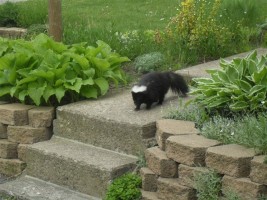
Hamilton health officials are warning residents that the raccoon rabies outbreak in the area has now spread to skunks.
Sixteen skunks tested positive last month for the same strain of the virus found in 42 raccoons since December.
But what has health officials worried, is 12 of those 16 skunk cases, were in urban areas, 10 on the Mountain and 2 in the lower east end increasing the risk to humans and their pets.
Hamilton Public Health official Susan Harding-Cruz says what’s troubling is that skunks tend to interact more with dogs and people.
She says people need to be aware that a skunk you see on the street, could be rabid, even if it appears to be docile.
As well the virus has spread to Niagara. Niagara Region is planning its own awareness campaign following the confirmation of its first raccoon rabies case near West Lincoln.
The first case of raccoon rabies in 25 years has been discovered in West Lincoln, in the Caistor Centre area.
Skedaddle Humane Wildlife Control has experienced a usually high number of calls regarding homeowners dealing with skunks. Feb. –March is skunk’s mating period, as well as the warmer temperatures are most likely keeping them more active than usual.
If you think you have a skunk living on your property, call Skedaddle Humane Wildlife Control today: 1.888.592.0387.
Proudly Serving: Kitchener-Waterloo, Cambridge, Guelph, London, Ottawa, Montreal and Halifax. Mississauga, Oakville, Burlington, Hamilton, Sudbury, St. Catharines, Brampton and Niagara.


